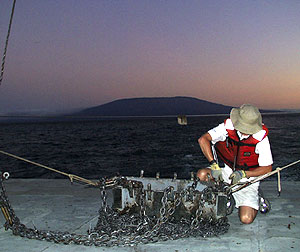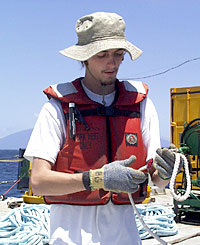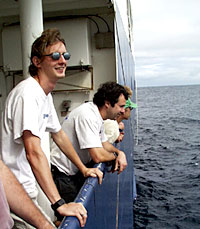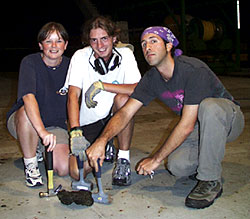|
|
Interviews: Geologist Ben Grosser
How did you become interested in geology?
I've always been interested in rocks. When I was a kid, growing up in Pennsylvania, I would wander through the woods pick up rocks and bring them home. It drove my parents nuts, because they would often find the rocks later in my pockets while they were doing the laundry. I never actually studied rocks until college. I was thinking of majoring in business at the University of North Carolina in Wilmington when I went to a paleontology seminar on the mass extinction of dinosaurs 65 million years ago. I was fascinated by the shear power of the suspected meteorite impact, which scientists believe killed the dinosaurs. I found it really amazing. I took some basic geology courses and then changed my major. Question: How have you enjoyed the cruise so far? Ben: I’m hearing people talk about how they want to be back on land, but I’m in no hurry. It’s really nice here. Seeing all the wildlife and the different islands is amazing. The only islands I’ve ever seen have been barrier islands in the Outer Banks of North Carolina, but they have bridges connecting them so they don't seem much like islands. It’s weird to be out in the middle of the ocean and have land pop up. Question: What homework have you been working on while you’ve been out at sea? Ben: I’m missing a month of graduate school at the University of Idaho so I’m going to have to do some catching up when I get back. For homework, I have three problem sets. The first one took me about an hour and then the second one took me about four hours. Both were for my introductory course in geochemistry. The third one is for Denny Geist’s class in physical petrology. I’ve spent about eight hours on it so far and I still have more to do. Most of the problem sets require making graphs, analyzing the data and looking for relationships.
What is it like working on the 4 to 8 shift ? Ben: When Dennis first told me the 4 to 8 shift is the best shift, I didn’t believe him. But it’s true. I watch the sun set and rise every day. We have meals - dinner at 5 p.m. and breakfast at 7:30 a.m. - to break up the shift. I usually don’t go to bed until 11:30 p.m. so I can watch a movie if I want or read. I just finished reading “The Hobbit” for the second time. I usually wake up at up at 3:30 a.m., and I amuse the 12 to 4 watch. They’ve been up drinking coffee for four hours so when I stumble in at quarter to 4 a.m. it’s quite entertaining. They will all wave and say “Hi!” with bright cheerful smiles and I’ll usually just wave back. Denny said yesterday, “Ben doesn't speak for the first half an hour in the morning so just leave him alone.” We have a friendly rivalry with the other watches, too. When we first started dredging by luck we were the only group getting rocks. And we had the first two biggest hauls, because the teeth on the dredge were still really sharp. Question: Where else, besides the Galápagos and Costa Rica, has geology taken you? Ben: I’ve done mapping projects and fieldwork in North Carolina, South Carolina, Georgia, West Virginia, Virginia, California, New Mexico and Colorado. I worked on fracture studies in North Carolina and as an undergraduate student was working with Dr. Blake making thin sections. I have to thank both my parents and my professors, because without them these trips wouldn’t have been possible. I’ve enjoyed a lot of freedom in my work. For the past five years I have supervised others and haven’t had anyone hovering over me telling me what to do. And when I know that the people I’m in charge of understand what they need to do I trust them to get it done correctly.
What has been some of the more challenging experiences for you? Ben: I spent six weeks at a geology field camp this summer. A little more than half of the time was in New Mexico where the temperatures reached 110 degrees Fahrenheit. The rest of the time we were in the high elevations of Colorado where it would drop below freezing at night and we would wake up with frost on our tents. We were mapping rugged terrain and I was constantly falling down and getting scraped and bruised. At one point we ran out of trail on steep hill we were crossing laterally. I blocked another student from falling down the face of the cliff by wedging my body down slope of where we were crossing so she could crawl behind me. Before that trip I thought everyone had a limit to what they could do and learn. But I don’t believe in setting limits any more. I believe now that you can push yourself further than you might think it possible. |
||||||||||
Mailing List | Feedback | Glossary | For Teachers | About Us | Contact
© 2010 Dive and Discover™. Dive and Discover™ is a registered trademark of
Woods
Hole Oceanographic Institution

 Ben prepares the dredge for deployment with the sun setting below Fernandina volcano in the background.
Ben prepares the dredge for deployment with the sun setting below Fernandina volcano in the background.

